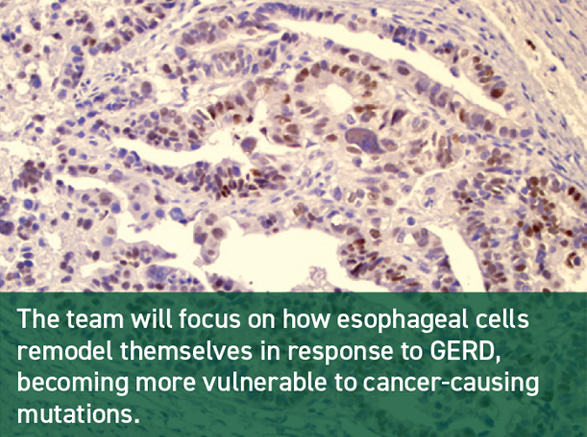- Message from the Director
- Chair, Board of Governors Message
- Board of Governors
- Leadership
- Sylvester Locations
- Sylvester by the Numbers
-
-
- Sylvester Researchers Receive $9.5 Million Grant To Study Esophageal Cancer
- NCI To Fund Sylvester-Led Study On How Exercise And Nutrition May Improve Ovarian Cancer Outcomes
- Researchers At Sylvester, Frost School Receive $2.6M Federal Grant To Study Mindfulness And Music Therapy
- Tow Foundation Commits $2 Million To Multiple Myeloma Research At Sylvester
- Sylvester Researchers Receive $2M To Conduct Clinical Trial On Unique Immunotherapy
- $1.8 Million NIH Grant Supports Head And Neck Cancer Research
- Sylvester Researchers Receive $1.7 Million NIH Grant To Study Epigenetic Mechanisms In ER Breast Cancer
- New Research Highlights Racial Disparities In Genomic Profiling
- Partnership To Identify Novel Genetic Drivers Of Cancer Disparities In African Ancestry Populations
- Our Phase 1 Clinical Trials
- Investigator-Initiated Trials (IIT)
- The Lifestyle Intervention Of Food And Exercise For Lymphoma – The LIFE-L Study
-
- Sylvester Partners With PAHO WHO To Train Caribbean Clinicians In Mammography Quality Assurance
- Sylvester Rectal Cancer Program Receives Elite NAPRC Accreditation From American College Of Surgeons
- The Lancet Publishes Sylvester-LED Study Defining New Standard Of Care For Prostate Cancer Recurrence After Prostatectomy
- Sylvester Plays Pivotal Role In Practice-Changing Anal Cancer Prevention Study Published By Nejm
- Dr. Donald T. Weed Works To Bridge Global Disparities In Head And Neck Surgery, From Haiti To Africa
-
- Paving The Path To Greatness: A Decade Of Transformation And Commitment To Excellence Celebration Honors Dr. Dipen J. Parekh And Dr. Stephen D. Nimer
- Dr. Antonio Iavarone Joins Sylvester As New Deputy Director
- Dr. Alberto Caban-Martinez Joins Prestigious Occupational And Environmental Health Organization
- Sylvester Names Dr. Sophia George To Lead The Cancer Center’s Focus On Inclusive Excellence
- Sylvester Researcher Receives $5 Million NCI Merit Award For Brain Cancer Adaptive Therapy Study
- Ph.D. Candidate At Sylvester Receives Prestigious F31 NCI Grant
- Sylvester’s Lead Of Evidence Based Survivorship Supportive Care Receives ABMR Early-Stage Investigator Award
- Neurosurgeon Ashish Shah Returns To Sylvester To Head Clinical Trials And Translational Research On Brain Tumors
- Sylvester Pancreatic Cancer Researcher Dr. Nagaraj Nagathihalli Awarded Florida Department Of Health Grant
- Scott M. Welford, Ph.D. And Dr. Priyamvada Rai To Co-Lead Sylvester’s Tumor Biology
- Employees Who Go Above And Beyond At Sylvester Earn Special Recognition
-
- Surviving And Thriving
- Sylvester Goes To Capitol Hill In Support Of Comprehensive Cancer Survivorship Act
- Sylvester’s Sexual Health After Cancer Program Expands To Meet Needs Of Women With Cancer
- Sylvester Celebrates Inaugural Cancer Survivorship Symposium
- Young Cancer Survivors Share Experiences, Support At Sylvester’s Aya Summit
- Testicular Cancer Patient, Against All Odds, Is Now A Father
- New “Believe In You” Training Program To Help Cancer Survivors Live A Healthier Lifestyle
- Art Is Medicine
- Spreading The Holiday Spirit To Children At Alex´s Place
- Cancer Support by the Numbers
-
- First Lady Jill Biden Visits Sylvester Comprehensive Cancer Center To Spread Breast Cancer Awareness
- Sylvester Leaders Meet With White House Officials, Agencies About Reducing Cancer
- Sylvester Game Changer Vehicle Among First In Nation To Offer Mobile Prostate Cancer Screening
- Sylvester Hosts Fourth Annual National Firefighter Cancer Symposium
- Florida Academic Cancer Center Alliance Brings Cancer Researchers Together During Annual Retreat
- Sylvester Researchers Identify High Death Rate From Gastric Cancer In South Florida
-
- Dolphins Challenge Cancer XII Raised Record-Breaking $8.4 Million For Sylvester
- Steeped In Tradition And Ceremony
- Sylvester’s 30th Naming Anniversary Celebration Honors Family’s Philanthropy And Foresight
- The Pap Corps Celebrated 70th Anniversary Supporting Cancer Research
- Gift Establishes Eileen Youtie Predisposition Syndrome Initiative At Sylvester
- Janet And Mark Levy Recognized For Gift To Advance Cancer And Neurology Research
- Honoring A Promise
- Jernigan Family Funds Research And Therapy At Sylvester
- Our Donors in 2022
Researchers to investigate esophageal adenocarcinoma (EAC), the most common form of esophageal cancer in the United States.
Researchers at Sylvester Comprehensive Cancer Center at the University of Miami Miller School of Medicine have received a $9.5 million National Cancer Institute Program Project (P01) grant to investigate esophageal adenocarcinoma (EAC).

“This grant is a testament to the impactful research already underway at Sylvester that is paving the way in providing patients with the best care today, and I am confident the team, under Dr. El-Rifai, will make great progress,” said Stephen D. Nimer, M.D., director of Sylvester. “With these resources, our researchers can learn more about this disease and create better tools to continuously improve patient care.”
While only around 2% to 3% of patients progress from Barrett’s esophagus to EAC during their lifetimes, these cancers have a dismal, 15% five-year survival rate. In the past 30 years, EAC prevalence has increased 600%.
“We are beginning to understand how esophageal cells adapt to GERD’s acidic environment and how those changes can lead to Barrett’s esophagus and eventually cancer,” said Dr. El-Rifai. “Now, we have to find better ways to intervene. More than 18,000 people in the U.S. die from EAC each year — we need to do better.”